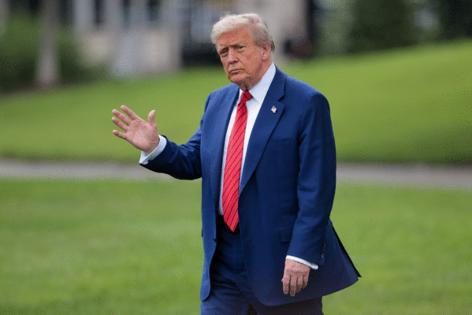Judge seeks US assurances on deportations in birthright case
Published in News & Features
A judge overseeing a challenge to President Donald Trump’s restrictions on automatic birthright citizenship asked the U.S. government to confirm it won’t seek to deport impacted children during the Supreme Court’s 30-day pause on enforcement of the directive.
U.S. District Judge Deborah Boardman in Maryland said during a hearing Monday that such written assurances, which she requested from the Justice Department by noon Tuesday, would prevent the need for a temporary restraining order pausing Trump’s directive for at least two weeks that was requested by immigrant-right groups.
The groups asked for the order after the Supreme Court last week told judges in three cases to reconsider — and potentially narrow — nationwide injunctions they issued against Trump’s executive order. The high court, however, put a 30-day delay on Trump’s order, allowing time for the groups and states that sued to adjust their legal strategies.
The hearing illustrates how judges are responding to the Supreme Court landmark decision, which will have far-reaching consequences for lawsuits challenging government policies. The nation’s top court hasn’t yet ruled on the constitutionality of Trump’s Jan. 20 executive order, part of a broad crackdown on undocumented immigrants.
Boardman said she wouldn’t rule on the request for a TRO until she’d reviewed the Justice Department’s filing. The judge said she would then turn her attention to the groups’ request for a longer-lasting preliminary injunction — under the groups’ new legal strategy — that would once again block enforcement of the executive order while the case proceeds.
Unlike the nationwide injunctions issued earlier that were paused by the Supreme Court, the new TRO applies to a specific group: babies born in the U.S. on or after Feb. 19 who would be ineligible for citizenship under Trump’s order, as well as their parents. Boardman has also been asked to grant class-action status for the case to represent that same group.
Trump’s executive order would jettison what has been the widespread understanding that the Constitution’s 14th Amendment confers citizenship on virtually everyone born on U.S. soil. Trump would restrict that to babies with at least one parent who is a U.S. citizen or green card holder, meaning that even the newborn children of people on temporary visas wouldn’t become Americans.
Meanwhile, a group of Democratic-led states on Monday filed a letter with a federal judge in Massachusetts suggesting the government file a brief by July 8 outlining what changes it believes should be made to the nationwide injunction in that case in light of the Supreme Court’s ruling. The letter, by New Jersey Attorney General Matt Platkin, noted that the Supreme Court indicated a nationwide injunction may still be necessary in the states’ case in order to give them full relief.
The Supreme Court opinion stayed all three injunctions “only to the extent that the injunctions are broader than necessary to provide complete relief to each plaintiff with standing to sue.”
_____
(With assistance from Greg Stohr.)
_____
©2025 Bloomberg L.P. Visit bloomberg.com. Distributed by Tribune Content Agency, LLC.







Comments